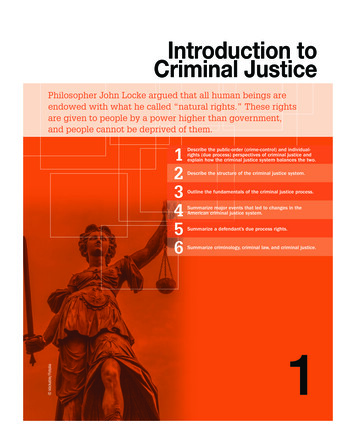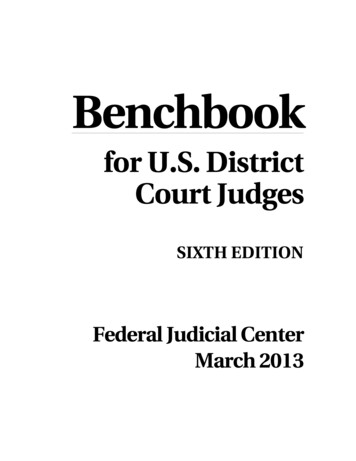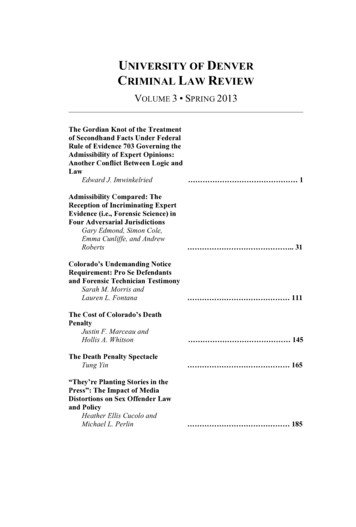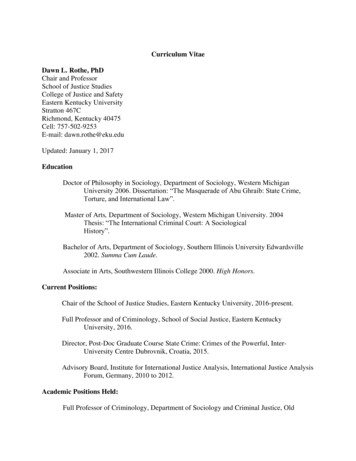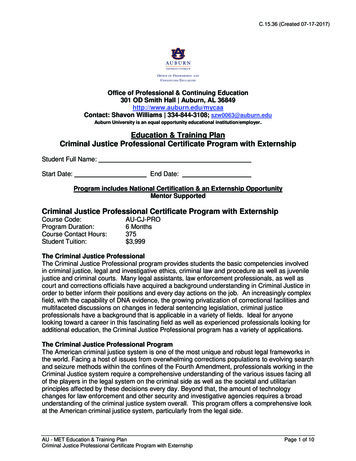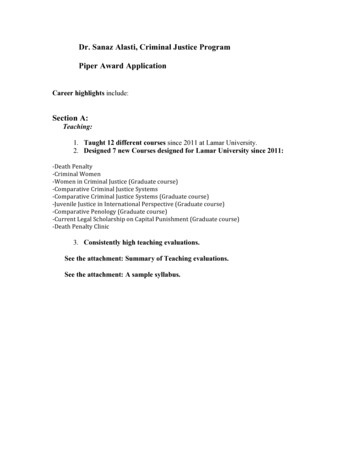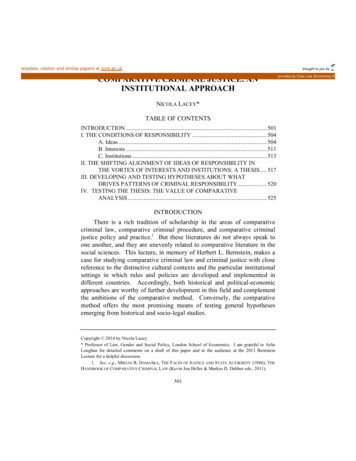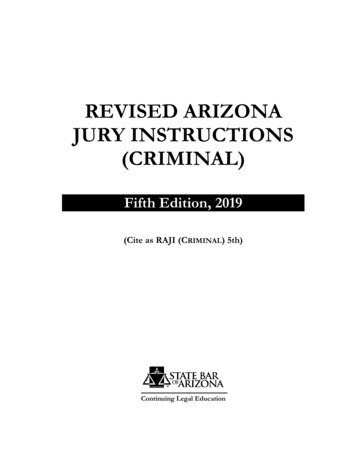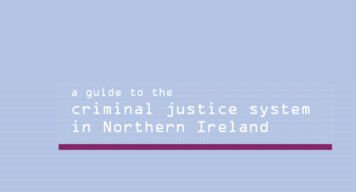
Transcription
a guide to thecriminal justice systemin Northern Ireland
This Guide to the Criminal Justice System inNorthern Ireland has been designed to explaineach aspect of the system, and the roles andresponsibilities of those working within it.It should guide you through the system frombeginning to end, providing information for avariety of users of the system.The Criminal Justice System Northern Ireland (CJSNI)is made up of 7 main statutory agencies:Northern Ireland Court ServiceNorthern Ireland OfficeNorthern Ireland Prison ServicePolice Service of Northern IrelandProbation Board for Northern IrelandPublic Prosecution ServiceYouth Justice AgencyNICtSNIONIPSPSNIPBNIPPSYJA
The CJSNI is responsible for investigating crimes, finding thepeople who have committed them, and bringing them to justice.It also works to help the victims of crime, and to rehabilitateoffenders after their punishment.The purpose of the CJSNI is:to support the administration of justice,to promote confidence in the criminaljustice system, and to contribute to thereduction of crime and the fear of crime.
The CJSNI aims to-provide a fair and effective criminal justice system for the community;-work together to help reduce crime and the fear of crime;-make the criminal justice system as open, inclusive and accessibleas possible,and promote confidence in the administration of justice; and-improve service delivery by enhancing the levels of effectiveness,efficiency and co-operation within the system.
As well as tackling crime and the fear of crime, the CJSNI also has responsibility for ensuringthat criminal law is kept up to date. The laws of the United Kingdom are divided into civillaw and criminal law, and these laws affect each of us every day in everything we do. Criminallaw is there to protect us from crime. Civil law deals with relations between individuals, forexample when we buy a house or when we get married. These laws are there to both protect us, andto ensure protection for everyone else.Since the Human Rights Act 1998 came intoforce, all laws must comply with the EuropeanConvention on Human Rights. In upholding theselaws, each organisation within the CJSNI alsoagrees to adhere to these standards.Most of us have some knowledge of the criminaljustice system through what we read, or see onTV or in the cinema. However, books and filmsvery rarely give an accurate picture of how thesystem works. This document has been designedto guide you through the criminal justicesystem and to help you understand the roles andresponsibilities of those working within it.You may already be aware that the CJSNI isgoing through an ambitious process ofmodernisation and reform; this guide will beupdated as changes occur.One of the aims of the CJSNI is to make thesystem easy to understand and open to everyone;we believe this will create greater confidence inthe system. Hopefully this guide will improveyour understanding by showing, step by step, thecore processes, from when a crime is committed,through to the end result, whether that isprison, community disposal or other punishment.We hope this guide will demonstrate how thecriminal justice system operates to serve andprotect the people of Northern Ireland.
Police Service ofNorthern IrelandNorthern IrelandPrison ServiceRole:Making Northern Irelandsafer for everyonethrough professionalprogressive policing.Role:To provide prisonservices in NorthernIreland. Statutoryduties are set outin the Prison Act(Northern Ireland) 1953and rules made underthe Act.Northern Ireland Court ServiceRole:Serving the community through theadministration of justice in NorthernIreland. Through:- facilitation of conduct of the businessof the courts;- effecting judgments to which theJudgments (Northern Ireland) Order1981 apply; and- the provision of policy advice andlegislative support to the Lord Chancellor.CJSNIDirector of PublicProsecutionsProbation Board forNorthern IrelandRole:To consider thefacts or informationcontained in policeinvestigation files andreach decisions asto prosecution or noprosecution.Role:To carry out riskassessment and providepre-sentence reports tothe courts. Tointegrate offenderssuccessfully into thecommunity by reducingre-offending.Northern Ireland OfficeRole:To support and help develop an efficient,effective and responsive criminal justicesystem in Northern Ireland by working inpartnership to:- modernise the criminal justice systemand promote community confidence in it;- reduce criminality and the fear ofcrime; and- develop and maintain a relevant body ofcriminal law.Youth JusticeAgencyRole:To support the deliveryand development ofkey services aimed atturning young peopleaway from crime.Forensic ScienceNorthern IrelandRole:To provide effectivescientific advice andsupport to enhance thedelivery of justice.
when a crimeis committed
08A GUIDE TO THE CRIMINAL JUSTICE SYSTEM IN NORTHERN IRELANDWHEN A CRIME IS COMMITTEDWhat is the role of thepolice at the scene of a crime?The police will investigate the offence. They make sure that no-one spoils theevidence at the crime scene, often by taping off the area. If the offence isa serious one, the crime scene may be photographed and independent forensicscientists may visit it and take samples for examination in the laboratory.If the perpetrator cannot be identified, the police will interview all those,including suspects, who might be able to provide useful information.A police Scene of Crime Officer will often examine the area to find evidence ofhow the crime occurred and who committed it. The Scene of Crime Officer is aperson who has a scientific/forensic background and investigates scenes of crimefor evidence of a forensic nature. The evidence gathered may be used in thepolice reports and then in court.
09A GUIDE TO THE CRIMINAL JUSTICE SYSTEM IN NORTHERN IRELANDWHEN A CRIME IS COMMITTEDWhen can the police arrest?When necessary, the police can use powers to arrest someone either with orwithout a warrant. An arrest warrant is written authority, signed by a Laymagistrate, directing the police to carry out an arrest. However, police canalso arrest without a warrant in the following circumstances:-they suspect that a person has committed, is in the process of committingor is about to commit an arrestable offence (usually more serious offences);-they suspect thatand has failed toother people fromprevent damage to-they suspect the person of being a terrorist or that they have committed,are committing or are about to commit a terrorist offence.a person has committed or is committing a lesser offencegive a name and address, or it is necessary to protectharm, or to protect a child or other vulnerable person, orproperty; orIn all cases, the police have the power to use reasonable force to secure thearrest.
10A GUIDE TO THE CRIMINAL JUSTICE SYSTEM IN NORTHERN IRELANDWHEN A CRIME IS COMMITTEDWhat happens during arrest?Firstly the police officer involved must consider if there is a legal authorityto carry out the arrest and if a power exists to do so.During arrest the police officer will inform the person at the time or as soonas practicable that they are under arrest and the grounds for the arrest.A police officer can make a discretionary decision to grant bail to an arrestedperson without taking them to a police station on the condition that the personattends a specified police station at a later, specified date. This is commonlyknown as “street bail”.Other than when granted street bail, a person arrested for an offence must betaken to a police station as soon as practicable.An arrested person must be cautioned.
11A GUIDE TO THE CRIMINAL JUSTICE SYSTEM IN NORTHERN IRELANDWHEN A CRIME IS COMMITTEDThe cautionYou do not have to say anything, but I mustcaution you that if you do not mention whenquestioned something which you later rely on incourt, it may harm your defence. If you do sayanything it may be given in evidence”
12A GUIDE TO THE CRIMINAL JUSTICE SYSTEM IN NORTHERN IRELANDWHEN A CRIME IS COMMITTEDThe cautionOn arrest, the police must caution the person. This means theymust tell them that they have the right to remain silent andanything they do say may be used as evidence in court.They must also be told that if they fail to say something thatthey later wish to state in court then the fact that they did notmention it when they should have could also be used against them.The caution must be given unless the arrested person has beencautioned immediately before the arrest or it is impracticable todo so because of the person’s condition at the time. They willalso be advised that they have a right to obtain free legal advicebefore answering police questions.The police must give the caution in the following circumstances:-when there are grounds to suspect a person of an offence;upon arrest; orwhen a person is to be charged or informed that they may beprosecuted for an offence.
13A GUIDE TO THE CRIMINAL JUSTICE SYSTEM IN NORTHERN IRELANDWHEN A CRIME IS COMMITTEDIf the person is under 17 years old, a caution must be given againat the police station in the presence of an appropriate adult.The parent, guardian or relative should be the appropriate adult,unless they:-are suspected of involvement in the crime;are the victim of the crime;are a witness to it;are involved in the investigation; orhave received admissions prior to attending to act as anappropriate adult.A young person can object to a parent acting as an appropriateadult. If the parent or guardian is not available, a social workeror other responsible adult aged 18 years or over, may act asan appropriate adult, provided they are not a police officer oremployed by the Northern Ireland Policing Board.
14A GUIDE TO THE CRIMINAL JUSTICE SYSTEM IN NORTHERN IRELANDWHEN A CRIME IS COMMITTEDWhat happens atthe police station?Can the police searchme if I am arrested?The arrested person will meet a CustodyOfficer who is responsible for:The police have the power to search a person who has been arrested if thatperson is a danger to themselves or others, or has concealed anything theymight use to assist escape from lawful custody or which might be evidencerelating to an offence. This is the case if they have been arrested at a placeother than a police station.-the detention and treatment of personsin custody;-maintaining a complete and accuraterecord of the detained person’s timein custody;-ensuring that all detained persons aredealt with as quickly as possible andthat they are released as soon as thereis no longer any need to detain them; andThe police can only search to the extent reasonably required. For example, aCustody Officer is responsible for ascertaining what property a detained personhas with them when they arrive at a police station. The Custody Officer willauthorise a search to the “extent that is reasonably required”. This willconsist of not more than the removal of the outer clothing, and a search of the‘pat down’ type. A male officer would search a male person and a female officer afemale person.-ensuring that all detained persons aretreated in accordance with the Police andCriminal Evidence (NI) Order 1989 andCodes of Practice.The police can search premises in which the arrest took place at the time ofthe arrest, or premises in which the person was immediately before arrest. Asearch of premises can also be made on the authority of an Inspector.
15A GUIDE TO THE CRIMINAL JUSTICE SYSTEM IN NORTHERN IRELANDWHEN A CRIME IS COMMITTEDYour right tolegal adviceEveryone has the right to obtain legal advice and must beinformed of this in writing.In certain circumstances this right can be delayed for up to36 hours but cannot be denied. For this delay to be exercisedthe offence must be of a serious nature, where there is achance the person will:-interfere with evidence or physically harm other persons;alert other suspects who have not yet been arrested; orhinder the recovery of property.If they do not have a solicitor, one will be provided.If a person is being questioned by the police, whether theyhave been arrested or not, such advice or assistance can beprovided free, regardless of their financial means.
16A GUIDE TO THE CRIMINAL JUSTICE SYSTEM IN NORTHERN IRELANDWHEN A CRIME IS COMMITTEDFingerprints andnon-intimate samplesWhilst in police detention the detainee may be asked to providefingerprints or a non-intimate sample. A non-intimate sample isdefined as:-a sample of hair, other than pubic hair, which includes hairplucked with the root;a sample taken from a nail or from under a nail;a swab taken from any part of a person’s body including themouth but not any other body orifice;saliva;a skin impression (which means any record, other than afingerprint, which is a record, in any form and produced by anymethod, of the skin pattern and other physical characteristicsor features of the whole, or any part of, a person’s foot orof any other part of their body).In most cases written consent must first be given. In the case ofthose under 14, only the consent of their parent or guardian isrequired.Police may take fingerprints without consent:--from any person detained in consequence of their arrest for arecordable offence and who has not had their fingerprints takenin the course of the investigation of the offence by thepolice; orfrom a person charged with a recordable offence or informedthat they will be reported for such an offence and who has nothad their fingerprints taken in the course of the investigationof the offence by the police.The person whose fingerprints are taken without consent must begiven the reason for doing so and this reason must be recorded assoon as practicable.
17A GUIDE TO THE CRIMINAL JUSTICE SYSTEM IN NORTHERN IRELANDWHEN A CRIME IS COMMITTEDPhotographsPolice may take non-intimate samples without consent:from any person in police detention in consequence of their arrest for arecordable offence, This is conditional on them not having had a sample of thesame type and from the same part of the body taken already in the course of theinvestigation or if one has, that it proved insufficient for the analysis; orthe sample taken may be used for inclusion on the database or for the purposeof the investigation of the offence.While someone is in police detention thepolice may take photographs of them.The person whose non-intimate sample is taken without consent must be given thereason for doing so and this reason must be recorded as soon as practicable.There are procedures in place to controlthe use of photographs and the police willnot use force in taking these photographs.These may be taken with or without thearrested person’s consent and the policecan ask them to remove anything from thehead or face.
18A GUIDE TO THE CRIMINAL JUSTICE SYSTEM IN NORTHERN IRELANDWHEN A CRIME IS COMMITTEDWhat happens when a childor young person offends?It isyoungdealtgo onimportant to emphasise that the majority of children andpeople who come to the attention of the police will bewith through a diversionary approach. Only a small numberto appear at court.The decision as to how to deal with a child or young personwho has offended will be based on a number of factors. Theseinclude:-admission of guilt;gravity/seriousness of the offence; orprevious offending history.The following outcomes may be recommended:INFORMED WARNINGThis is delivered by a trained police facilitator, involving thechild or young person and the parent(s)/guardian(s). The victimwill not be present in the majority of cases unless there areparticular reasons why they should be. Although the informedwarning is recorded on criminal record, it is not a courtconviction, and will not be treated as such. It will be removedafter 12 months unless further offending takes place. A criminalrecord is held at the Criminal Records Office and can be accessedin certain circumstances.Parents or guardians can access their child’s criminal recordby completing a form, which is then processed by the CriminalRecords Office. A school cannot access this information withoutthe parent’s authorisation.
19A GUIDE TO THE CRIMINAL JUSTICE SYSTEM IN NORTHERN IRELANDWHEN A CRIME IS COMMITTEDRESTORATIVE CAUTIONThis is delivered by a trained facilitator, involving the childor young person, the parent(s)/guardian(s) and the victim. Theprocess is designed to provide an opportunity for the youngperson who has offended to gain a greater understanding ofthe impact of their behaviour and its consequences and to helpthem take responsibility for their actions. The process alsoprovides a opportunity for the victims of crime to play an activerole in determining the outcome of the case. The victim has anopportunity to confront their offender within a safe environmentand seek answers to the questions which are important to them,if they wish to do so. The resolution will also be negotiatedbetween all the main parties involved. The process results in aRestorative Caution and is recorded on the offender’s criminalrecord for two and a half years (unless subsequent offendingtakes place). This is not a conviction.REFERRED FOR CONSIDERATION OF PROSECUTIONThis may be considered at any point, even for a first offence, ifthe circumstances merit it. The circumstances whereby a case canproceed to court directly in the first instance are:-when it is of a serious nature;when there is a significant offending history or theoffending is of a persistent nature; orwhere there is no admission of guilt.
20A GUIDE TO THE CRIMINAL JUSTICE SYSTEM IN NORTHERN IRELANDWHEN A CRIME IS COMMITTEDIs this informationshared with anyone else?ChargingIf the police are dealing with a child or young person in relation to offendingbehaviour, details will be shared with the following agencies:If there is enough evidence to show thatthe suspect committed the offence, thenthey may be charged.-Probation Board;Education Welfare;Social Services; andYouth Justice Agency.The purpose of sharing this information is to identify any specific and relevantinformation those agencies may have which should be considered when decidinghow to deal with the child or young person. This information could establishwhy a child or young person has chosen to offend. An example of this would bewhere a person steals items of food from a local shop because they are notprovided with regular meals at home.In the case of children and young peoplewho have offended, charging will be theexception rather than the rule.
first appearanceat court
22A GUIDE TO THE CRIMINAL JUSTICE SYSTEM IN NORTHERN IRELANDFIRST APPEARANCE AT COURTRemandRemanded in custodyWhen a person is charged with a crime thelaw requires that they must appear in courtas soon as possible, to be remanded incustody or released on bail. The residentmagistrate (magistrate) will considerhow serious the alleged crime is and ifthere is sufficient evidence to connect theaccused to the crime. If the accused hasbeen charged with a terrorist type offence,decisions on bail have to be referred tothe High Court.If the accused (defendant) agrees, has been previously remanded in custodyor is detained under a custodial sentence for other offences, they can beremanded for a period of up to 28 days, otherwise they will be remanded forup to 8 days.If the defendant is under 21, and the magistrate has directed that they beremanded in custody, they will be taken to a young offenders centre, or,if they are under 17 1 2, they may be held in a juvenile justice centre.If they are over 21 then they will be remanded in Maghaberry Prison orHydebank Wood Prison for female prisoners.
23A GUIDE TO THE CRIMINAL JUSTICE SYSTEM IN NORTHERN IRELANDFIRST APPEARANCE AT COURTRemanded on bailWhat isa summons?If the defendant is to be released on bail they will be allowed to go freefollowing the signing of a bail order. Certain conditions will have to be met,for example a curfew may be imposed or they may not be allowed in certain areasor to meet with certain people. A young person may be referred to the YouthJustice Agency’s Bail Support Scheme.A summons is a document served on anaccused person requiring them to appearat court. It will always contain theoffence(s) with which the person is accusedand will also state the name and locationof the court as well as the time and dateof the hearing. If the accused person failsto turn up at the court and it is clearthat they have received the summons, awarrant may be issued by the magistratefor the police to arrest them and bringthem to court.If any of the bail conditions are broken or if the defendant fails to appearfor their hearing, the magistrate shall order a sum of money to be paid by thedefendant (or a third party who has agreed to provide bail). It is likely thatthe defendant will be arrested and brought before the magistrate for breach ofbail.The decision whether or not to prosecute an accused person is usually made by thePublic Prosecution Service. If the accused has already been charged, then a datewill be set for a hearing of the case in court. If they have not been chargedand a decision is made to prosecute them for the crime, then a summons may besent to the accused requiring them to attend court at a certain time and date.
24A GUIDE TO THE CRIMINAL JUSTICE SYSTEM IN NORTHERN IRELANDFIRST APPEARANCE AT COURTSubmission of afile to PPSThe PPS formally came into existence inJune 2005. The new Prosecution Servicemakes prosecution decisions in all seriouscriminal cases formerly dealt with bythe Department of the Director of PublicProsecutions (DPP), cases such as murder,serious assaults, fraud, fatal road trafficoffences and many others. It also dealswith cases where complaints are madeagainst the police or security forces.Although the name of the organisationchanged, the head of the PPS will,however, still be known as the Director ofPublic Prosecutions.In the Belfast region and in the countiesof Fermanagh and Tyrone, the PPS now takesprosecution decisions in all criminalcases including those previously dealtwith by police. In those areas, policeinspectors no longer conduct prosecutionsin the magistrates’ courts and, instead,PPS prosecutors now present these cases.Although at present only fully operationalin those areas, the Public ProsecutionService will be extended with regionaloffices throughout the province, each officeheaded up by a Regional Prosecutor. Theroll-out of the Service will be completeby 2007.The Director treats all cases asserious not only because of the natureof an offence but also because of thetraumatic impact of even relatively minoroffences on victims and witnesses. Thenew prosecution service is committed todelivering a better service to victims andwitnesses.Occasionally, the Director may alsorequest the Chief Constable to investigatean incident and report the matter tohim for the Director’s decision as toprosecution.The Director is funded by Government.However, he is totally independent inthe decisions he makes. The Director,and his lawyers, carefully consider afile submitted by police in an individualcase and decide whether there is enough
25A GUIDE TO THE CRIMINAL JUSTICE SYSTEM IN NORTHERN IRELANDFIRST APPEARANCE AT COURTevidence to prosecute a person for oneor more criminal offence. Prosecutionsare brought where there is sufficientevidence to afford a reasonable prospectof obtaining a conviction, and whereprosecution is required in the publicinterest.what needs to be done. When the policeofficer in charge of the case has obtainedthe necessary information then it is sentto the prosecutor for a decision to bemade. Sometimes a prosecutor will want tospeak to a victim or witness in a casebefore making that decision.Sometimes when a file is sent to theDirector from the police, the prosecutormay consider that some furtherinvestigations are necessary before aprosecution decision can be made.If it is decided that there is enoughevidence to prosecute, and that the publicinterest requires prosecution, then theprosecutor will prepare the necessarycourt papers. In addition, to ensurefairness, the prosecutor will discloseto the defendant any matters which wouldundermine the prosecution case or assistthe defendant in preparing his defence.When further information is essential inorder to make a prosecution decision, a“Request for Further Information (RFI)”will be sent back to police setting outAll cases which are tried in the CrownCourt (except those prosecuted by theSerious Fraud Office) go to the PPS for adecision.Although a single lawyer is generallyresponsible for the prosecution decisionin every case, sometimes the matter isreferred to more senior lawyers in the PPSbecause of its difficulty or complexity.On occasion, the consent of the Directorhimself or the Attorney General is neededbefore a prosecution can begin.
26A GUIDE TO THE CRIMINAL JUSTICE SYSTEM IN NORTHERN IRELANDFIRST APPEARANCE AT COURTPPS RoleIf a decision has been made that an accused person is to beprosecuted, normally the PPS lawyer will decide whether thecase will proceed to the magistrates’ court or to the CrownCourt. The majority of offences, however, can only be heard in aMagistrates’ or Youth court.When satisified that there is sufficient evidence to afford areasonable prospect of a conviction, prosecution is still onlybrought if it is required in the public interest. Depending onthe circumstances of the case, it may not be necessary in thepublic interest to prosecute someone who is very old or veryyoung or infirm. Sometimes the nature of the behaviour is notsufficiently serious to require prosecution and can be dealt within other ways such as by an informed warning, caution or, in thecase of a young person under 18, a Youth Conference.A primary purpose of a Youth Conference is, in appropriatecases, that young offenders can be directly confronted by theirvictim(s) in order that they may fully appreciate the effectof their criminal behaviour on that person. An offender maybe unaware of the consequences that his or her actions havecaused. A Youth Conference will give offenders an opportunity tounderstand clearly, for example, the financial hardship that theftby them may cause on a shopkeeper or the fear and anxiety thatan assault may have had on a young or elderly person. A plan isagreed for an offender to carry out a programme of service to thevictim of his/her crime or to the community to help, in some way,to repay the loss or injury suffered. Failure to properly complywith this plan will result in a prosecution before the court forthe original offence. Briefly put, youth conferencing is intendedto bring home to young offenders the full reality of what theyhave done.
at court
28A GUIDE TO THE CRIMINAL JUSTICE SYSTEM IN NORTHERN IRELANDAT COURTCourtsMagistrates’ courtsThere are different types of court inNorthern Ireland. All criminal cases, eventhe most serious, such as murder, begin ina magistrates’ court.In a magistrates’ court the magistrate listens to the evidence and decideswhether the defendant is guilty or not guilty and, where appropriate,determines the sentence.WHO’S WHO IN MAGISTRATES’ COURTThere are many people in the court who are there for lots of different reasons.Some people work for the court, others are there to help the accused, some maybe witnesses, and other may be members of the public or press reporters.THE RESIDENT MAGISTRATES’ BENCHThe resident magistrate (magistrate) who occasionally wears a blue gown, sits in thecentre seat of the magistrates’ bench and should be addressed as ‘Your Worship’.THE COURT CLERKThe court clerk sits in the centre seat in front of the magistrate. They areresponsible for calling the cases before the court, recording the results andadministering the oath or affirmation to any person giving evidence in court.
29A GUIDE TO THE CRIMINAL JUSTICE SYSTEM IN NORTHERN IRELANDAT COURTTHE PROSECUTIONThe PPS puts the case against thedefendant. The prosecution must provetheir case beyond all reasonable doubt.A solicitor or barrister will representthe PPS. They sit on the bench immediatelyin front of the court clerk.THE DEFENCEThe defence solicitors and counselgenerally sit on the benches behind theprosecution and do not wear formal dressin the magistrates’ court. If their clientis pleading guilty or has been foundguilty of the charge, they enter a plea ofmitigation to the court (this is a plea toreduce the sentence by explaining to thecourt why the defendant carried out theoffence).If the defendant pleads not guilty orthe case is contested the defence andthe prosecution have the opportunity toexamine and cross-examine the witnesses.WITNESSESWitnesses are called in turn to thewitness box and are questioned by both theprosecution and defence.Before giving their evidence, a witnessmust take an oath holding a religioustext, or affirm that they will tell thetruth. The holy books of all those who arelikely to give evidence are available forwitnesses. Any person who wants to takean alternative oath should, if possible,inform the court clerk as soon as possibleso they can make the arrangements.
30A GUIDE TO THE CRIMINAL JUSTICE SYSTEM IN NORTHERN IRELANDAT COURTThe oathThe affirmationI swear by .(according toreligious belief) that theevidence I shall give shallbe the truth, the wholetruth and nothing but thetruth.I do solemnly, sincerelyand truly declare and affirmthat the evidence I shallgive shall be the truth,the whole truth and nothingbut the truth.
31A GUIDE TO THE CRIMINAL JUSTICE SYSTEM IN NORTHERN IRELANDAT COURTPROBATION BOARDA Probation Officer is available forcriminal court hearings. Their main roleis to provide assessments of defendants,usually in the form of Pre-SentenceReports, before the defendants aresentenced.PRESSThe local and national press often attendcourt sittings to report on cases ofinterest.
32A GUIDE TO THE CRIMINAL JUSTICE SYSTEM IN NORTHERN IRELANDAT COURTCrown courtAlthough many cases are entirely dealtwith by a magistrates’ court, the moreserious ones a
The Criminal Justice System Northern Ireland (CJSNI) is made up of 7 main statutory agencies: Northern Ireland Court Service NICtS Northern Ireland Office NIO Northern Ireland Prison Service NIPS Police Service of Northern Ireland PSNI Probation Board for Northern Ireland PBNI Public Prosecution Service PPS Youth Justice Agency YJA. The CJSNI is responsible for investigating crimes, fi nding .



